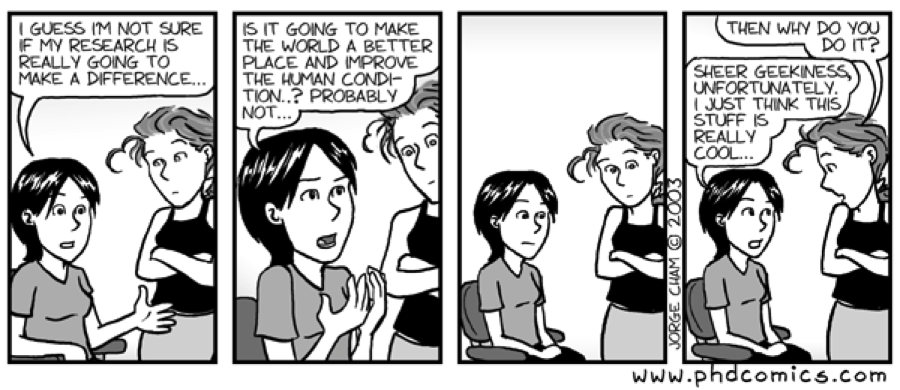This post was written by Catherine Giroux, a second year full-time M.Ed student based out of the North Bay campus. We’d like to thank Catherine for her well-researched, experiential contribution to our community.
Maybe it’s the lovely summertime weather or maybe it’s the fact that I’m reaching the tail end of my first thesis draft, but my concentration (like Elvis) has totally left the building. I’m finding that common in the M.Ed., actually. There are periods where it is really easy to focus on my thesis and then there are others where I lack the necessary motivation. It’s completely normal.
Despite my current writing plateau, I’d like to share some tips, tricks, and resources that I’ve learned while writing my thesis so far.
The 10 Commandments of Thesis Writing
- Thou Shalt Read the Thesis Handbook
Before you even consider writing a thesis, make sure you read the thesis handbook! It can be accessed here. Many of your thesis-related questions can be answered within, including how to choose a topic, how to find your ideal supervisors, how to write a proposal and go through ethics, and things that you should know for your defense. It truly is an invaluable resource.
- Thou Shalt Read Thine APA Manual (multiple times if necessary)
I can’t emphasize this one enough. I am finding the APA 6th ed. manual incredibly helpful. Even though I used APA format throughout my undergrad, it has been updated and it’s always a good idea to check my accuracy. Also, no one ever really tells you exactly how to write a results section or a discussion section, but if you read the APA manual, there are whole paragraphs and chapters on how to do just that. It’s very useful, so definitely take the time to read it!
- Thou Shalt Find a Way to Be as Organized as Possible
I know that you’ve probably heard this over and over again but finding a way to organize your research- your articles, your sound files, your participant interview transcripts, everything- is essential. I use a mix of Mendeley (I like that I can categorize my articles) and Dropbox (so I can share important documents with my supervisors and we can update them as necessary). There are undoubtedly other ways to do it though and I would certainly be interested in learning from you so feel free to drop me a line and let me know what works for you.
- Thou Shalt Not Send Unedited Drafts of Anything to Thy Supervisors
Remember back in the day before computers when things had to be written out by hand? Things would be written as first and second drafts before being typed as a perfect final copy. Think of your thesis as an important document that needs to be done in drafts. You want your supervisors to see your best work – not something riddled with spelling, grammatical, and structural errors. Work those out in your first draft. Your supervisors are there to help you out, but they aren’t your editors and they will be much happier to receive your work if they can read it through with ease and make comments on the content rather than the conventions.
- Thou Shalt Use Thy Supervisors as Resources
Don’t forget that your supervisors are fantastic resources. They are the professionals! They’ve totally got this school thing down. If you have questions about the program, your thesis, which route is right for you, or anything academic, feel free to talk to your supervisor(s) or faculty advisor(s). I’ve found working through problems and bouncing difficult thesis sections off my supervisors to be particularly helpful. If there’s a section I don’t quite know how to write, I can talk with them in person, organize a Skype call, or we can email back and forth. It’s a tremendous help.
- Thou Shalt Consider Presenting Your Work At Conferences
I know this isn’t exactly part of the writing process but it certainly helps to shape the writing process. Sharing your work with like-minded peers can be very informative and eye opening. Even if you aren’t very far in the research or writing process, peers and faculty at conferences can provide you with invaluable feedback that can shape the future directions of your project. Conferences might also take you outside your comfort zone, which can lead to personal growth.
- Thou Shalt Not Procrastinate (Too Much)
I find that with every section of my thesis, starting is the hardest part because I have to overcome mental block and the fear of failure. It’s like impostor syndrome sets in with each new chapter. Not only that, but every section of the thesis has a unique tone and writing style. How you write the results section is very different from how you write your literature review. It seems like I procrastinate every time I don’t know exactly what I’m doing. It’s my coping strategy. It’s not a good one though. Once I finally start writing, the words just kind of flow and it helps the mental block go away. That’s why I find it helpful to work on my thesis a little bit every day (or at least a bit every week). Even if I’m just reviewing it so that it stays fresh in my mind, looking at it and dealing with the content is important. Break it down into chunks. You can do it! As Lao Tzu said, the journey of a thousand miles begins with a single step.
- Thou Shalt Take Time for Thyself
On the flipside of the last commandment, your thesis can’t be the only thing you ever do. You need to find some sort of balance. I personally enjoy adding activities like swimming and Stand Up Paddleboarding into my weekly routine to mix things up. I must admit though that combating the isolation of online learning and thesis work is difficult and people who “get it” are sometimes hard to come by. That’s why making an effort to get together with peers is so important. Whether you attend the biweekly EGS Meetings, set up regular coffee dates with friends, or create a thesis/BBQ club during the summer, getting out of your own head and away from your thesis for a bit is every bit as important as working on it. I also find that when I put it away for a bit and do something else, I return to it with a fresh perspective and better ideas.
- Thou Shalt Remember to Thank Thy Supervisors
I can only imagine that it’s a lot of work to be a supervisor for an M.Ed. student. There’s certainly a lot of reading involved. Letting them know that you’re thankful for their efforts goes a long way. Chocolate is also a nice touch.
- Thou Shalt Honour Thine Inner Geek

Everyone has a motivation for writing a thesis. No one (that I know of) wakes up and says, “Hey, I really just feel like writing a 100-200 page document for the fun of it.” If you do, all power to you! Remember what drew you to your topic and return to that when you feel like giving up. Remember that your work has value and is adding to the current body of knowledge. Something got you excited about your topic when you chose it; try and return to that excitement throughout the writing process. It makes the writing much more fun.
And in case you need more… Here are some helpful resources!
- Completed Dissertations and Theses: You can access these through the Nipissing Library and pull ones that have similar styles to yours to see how former students wrote certain sections that you’re struggling with. They can be found here: http://www.eclibrary.ca/library/list-subject-dissertations-and-theses
- How to Write a Discussion Section: Here is a document from the APA for Grad Students on the Dos and Don’ts of writing a discussion section. I found it very helpful because this, for me, is the hardest part of my manuscript! http://www.apa.org/gradpsych/2006/01/findings.aspx
- How to Write an Abstract: I also found this very helpful. The U of T has some great writing resources worthy of exploration. http://www.writing.utoronto.ca/advice/specific-types-of-writing/abstract

Please feel free to share! If you have something really neat and helpful that hasn’t been mentioned, share it in the comments section so that we can all add to our Grad Studies tool-kits. Happy Thesis-ing!
